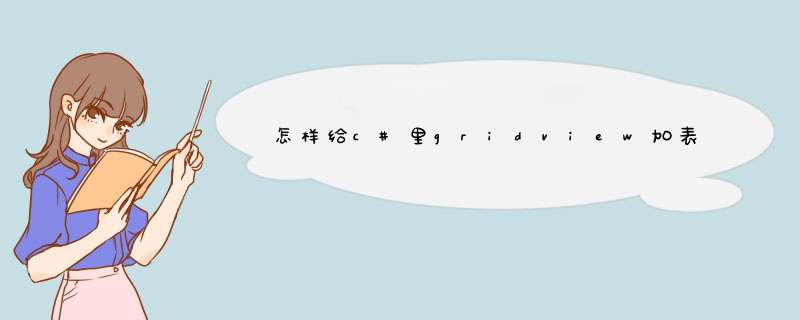
<style type="text/css">
.Freezing
{
position:relative
table-layout:fixed
top:expression(this.offsetParent.scrollTop)
z-index: 10
}
.Freezing th{text-overflow:ellipsisoverflow:hiddenwhite-space: nowrappadding:2px}
</style>
2.Javascript方法
//创建表头
if(document.getElementById("gvTitle") == null)
{
var gdvList = document.getElementById("gvCommon")
var gdvHeader = gdvList.cloneNode(true)
for(i = gdvHeader.rows.length - 1i >0i--)
{
gdvHeader.deleteRow(i)
}
document.getElementById("divTitle").appendChild(gdvHeader)
gdvList.deleteRow(0)
//gdvList.rows[0].style.display = 'none'
}
大致做法是利用JS方法Copy出一个表头 gdvHeader 放在一个“divTitle”的DIV中。
GridView是包含在“divGvData”DIV中的,然后设置divTitle的页面位置和divGvData的一致,也就是覆盖在上面。目前发现效果还行。有一点要注意,gdvHeader.id = "gvTitle"要重新设置一个ID,不然删除的还是GridView的数据行。
3.HTML中的部分代码:
<div id="divTitle" style="position:relativetop:0left:0overflow:hiddenwidth:978pxborder:0px solid red"></div>
<div id="divGvData" runat="server" style="position:relativetop:0pxleft:0pxoverflow:scrollwidth:994pxheight:450px" onscroll="funGrilViewScroll()return false">
<asp:GridView ID="gvCommon" style="position:relativetop:0pxleft:0px" runat="server" CssClass="gvFixd" BackColor="White" BorderColor="#999999" BorderStyle="None" BorderWidth="1px" CellPadding="3" AutoGenerateColumns="False" GridLines="Vertical" PageSize="5" AllowSorting="True" OnSorting="gvCommon_Sorting" >
<FooterStyle BackColor="#CCCCCC" ForeColor="Black" />
<RowStyle BackColor="#E7E7FF" ForeColor="Black" Font-Size="Small" />
<HeaderStyle HorizontalAlign="Center" BackColor="#000084" BorderColor="White" BorderWidth="1px" BorderStyle="Solid" Font-Bold="True" ForeColor="White"/>
</asp:GridView>
</div>
4.asp.net方法
protected void InitGridviewHeader(GridView _gv1, Table _tb1, Panel _pc1)
{
//Page.EnableViewState = false
//[Espal]Copiando las propiedades del renglon de encabezado
//[English]Coping a header row data and properties
_tb1.Rows.Add(_gv1.HeaderRow)
_tb1.Rows[0].ControlStyle.CopyFrom(_gv1.HeaderStyle)
_tb1.CellPadding = _gv1.CellPadding
_tb1.CellSpacing = _gv1.CellSpacing
_tb1.BorderWidth = _gv1.BorderWidth
//if (!_gv1.Width.IsEmpty)
//_gv1.Width = Unit.Pixel(Convert.ToInt32(_gv1.Width.Value) + Convert.ToInt32(_tb1.Width.Value) + 13)
//[Espa]Copiando las propiedades de cada celda del nuevo encabezado.
//[English]Coping each cells properties to the new header cells properties
int Count = 0
_pc1.Width = Unit.Pixel(100)
for (Count = 0Count <_gv1.HeaderRow.Cells.Count - 1Count++)
{
_tb1.Rows[0].Cells[Count].Width = _gv1.Columns[Count].ItemStyle.Width
_tb1.Rows[0].Cells[Count].BorderWidth = _gv1.Columns[Count].HeaderStyle.BorderWidth
_tb1.Rows[0].Cells[Count].BorderStyle = _gv1.Columns[Count].HeaderStyle.BorderStyle
_pc1.Width = Unit.Pixel(Convert.ToInt32(_tb1.Rows[0].Cells[Count].Width.Value) + Convert.ToInt32(_pc1.Width.Value) + 14)
}
//Panel1.Width = Unit.Pixel(Convert.ToInt32(_tb1.Rows[0].Cells[Count-1].Width.Value) + 12)
}
通过BoundField或TemplateField的HeaderText来设置列标题区别在于BoundField是固定Label显示形式的列绑定项,而TemplateField是可以在其中任意自定义显示形式的模版列绑定项,应用上相对灵活多变。
举例说明:
<asp:TemplateField
HeaderText="标题">
<ItemTemplate>
<asp:Label
ID="lbl"
runat="server"
Text='<%#Eval("Title")
%>'></asp:Label>
</ItemTemplate>
</asp:TemplateField>
<asp:BoundField
HeaderText="标题"
DataField="Title"></asp:BoundField>
这两者在显示效果上是一致的
但在实际应用中还是有很大区别的
简单举例说明:
1.TemplateField中的自定义可为多个;而BoundField是唯一的
2.TemplateField中的自定义项必须有一个ID,这样就可以在RowDataBind或ItemDataBind事件中对其项进一步进行复杂的处理;而而BoundField不具备ID,则在事件中不可再进一步处理。
欢迎分享,转载请注明来源:内存溢出

 微信扫一扫
微信扫一扫
 支付宝扫一扫
支付宝扫一扫
评论列表(0条)